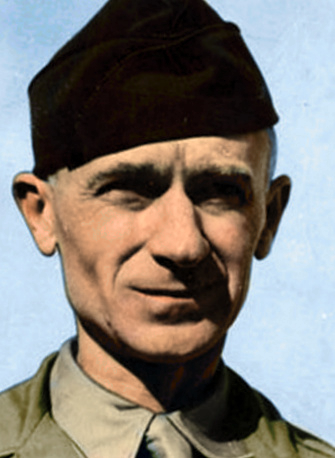Spruance’s plan: Take war to Japs
Admiral outtalks correspondents
By William McGaffin
…
Spring hats have variety and verve, with flowers favorite decoration
By Maxine Garrison
…

By Ernie Pyle
IN THE MARIANA ISLANDS (delayed) – Now we are far, far away from everything that was home or seemed like home. Five thousand miles from America, and 12,000 miles from my friends fighting on the German border.
Twelve thousand miles from Sidi Bouzid and Venafro and Troina and St. Mere-Eglise – names as unheard of on this side of the world as are Kwajalein and Chichi Jima and Ulithi on the other side.
The Pacific names are all new to me too, all except the outstanding ones. For those fighting one war do not pay much attention to the other war. Each one thinks his war is the worst and the most important war. And unquestionably it is.
We came to the Marianas by airplane from Honolulu. The weather was perfect, and yet so long and grinding was the journey that it eventually became a blur, and at the end I could not even remember what day we had left Honolulu, although actually it was only the day before.
We came in the same kind of plane that brought us from California – a huge four-motored Douglas transport, flown by the Naval Air Transport Service.
Formality dropped
As soon as we were in the air, Lt. Cmdr. Max Miller and I took off our neckties and put on our house slippers. West of Pearl Harbor, military formality immediately drops away. For example, in Honolulu, all naval officers must wear neckties. But the moment you leave Pearl Harbor they come off, and you never see them again.
Max and I read a while in the two books we had brought with us – Thurber’s My World and Welcome to It, and Joseph Mitchell’s McSorley’s Wonderful Saloon.
But good as they both are, we couldn’t seem to keep out minds on them, and pretty soon we were more willingly absorbed in a wonderfully informative book the Navy issues to westbound friends, called Guide to the Western Pacific.
Dots – but they find ‘em
We made but two stops in the 3,500-mile journey to the Marianas, and how we ever found those two tiny islands is beyond me, for they were the merest dots in the wide ocean. But they find them all the time, so who am I to worry?
Our first step was at Johnston Island, four hours out from Honolulu. As it came into view, I was shocked at how tiny it is. It is hardly bigger than a few airplane carriers lashed together, and it hasn’t got a tree on it.
Yet it has been developed into an airfield that will take the biggest planes, and several hundred Americans live and work there.
Chasing darkness
We stopped there for an hour in late afternoon, and then we took off and headed west and soon it was dark. Gradually the passengers went to sleep in their seats. There was nothing to see out of the windows but darkness; a long night over the Pacific lay ahead of us. The night was extra long, for we were chasing the darkness.
The flight orderly brought a blanket for each of us, and the passengers wrapped up. But soon most of them unwrapped, for the cabin was heated, and even at high altitude it became almost too bad.
It was after midnight when we could sense by the motors’ tone and the pressure in our ears that we were coming down. We couldn’t feel that we were coning down. We couldn’t feel that we were turning but we were, for now the moon would be high on one side of us, and a few moments later it would be low on the other side of us.
And then suddenly there were lights smack underneath us, lights of what seemed a good-sized little town, and then at last we were on the ground in an unbelievably hustling airport, teeming with men and planes and lights. The place was Kwajalein.
Great air base
That’s not hard to pronounce if you don’t try too hard. Just say “Kwa-juh-leen.” It’s in the Marshall Islands. There, during last March and April, American soldiers and Marines killed 10,000 Japanese, and opened our island stepping-stone path straight across the mid-Pacific.
Even today our Seabees can’t dig a trench for a sewer pipe without digging up dead Japanese. But even so the island is transformed, as we so rapidly transform all our islands that are destroyed in the taking. It is a great air base now.
Naval officers met our plane despite the hour, loaded us into jeeps, and drove us a few hundred yards to a mess hall. A cool night breeze was blowing, and it seemed wonderful to be on the ground again, even such scant and sorrowed ground as this.
For an hour we sat around a white-linened table and drank coffee and sipped iced fruit juice. You would hardly have known you were not in America. And then we were off again, to fly through the sightless night, westward and on westward.